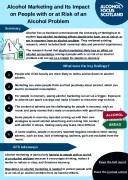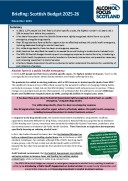Contact your representatives
There are a number of ways to contact your representatives and ask them to take action. Click the boxes below to find out more information about the different ways you can tell our politicians to act now.
Who should I contact?
-crop-1727781366-200.png) Different issues require contacting different representatives. Here are some tips to help direct your concerns effectively:
Different issues require contacting different representatives. Here are some tips to help direct your concerns effectively:
- For local community issues, such as the availability of alcohol licenses or community support, your local MSP is the best contact.
- For broader policy changes related to health, alcohol regulations, or education, consider reaching out to the relevant ministers, such as the Health Minister or Education Minister.
- Write to Them is a great tool to find your representatives using your postcode. You can also send an email directly to your representatives through this website.
If you’re unsure who to contact, you can start with your local constituency MSP, who can advise or escalate the issue to the appropriate ministers.
Write an email or letter
 Writing a letter or email can be an effective way to get your elected representatives to engage with an issue that matters to you. It can be hard to know where to start, so we have some tips you can follow:
Writing a letter or email can be an effective way to get your elected representatives to engage with an issue that matters to you. It can be hard to know where to start, so we have some tips you can follow:
- Let them know you’re a constituent by including your address.
- Be polite and concise.
- Tell them why the issue matters to you. You can include any personal details you feel comfortable sharing or talk about issues relevant to where you live. You can use our alcohol harm profiles to include facts and figures about alcohol harm in your area.
- Explain what you would like to see change or done.
- Ask them what they plan to do to make this happen.
Download our email template here to get started.
Arrange a meeting
 You can meet with your local MSPs and councillors to share your concerns with them. Local voices have a strong impact, and arranging a meeting means you can speak to them directly and engage in conversation.
You can meet with your local MSPs and councillors to share your concerns with them. Local voices have a strong impact, and arranging a meeting means you can speak to them directly and engage in conversation.
- Most MSPs hold surgeries in their constituency that you can attend. You can find out where and when your local representative hosts surgeries on their website. Some now require you to book a slot ahead of time, rather than turning up on the day.
- Some MSPs now offer virtual surgeries. Book an appointment online on your local MSPs website.
If you meet with your MSP, you may have a limited time slot. Below are some tips to make the most of your conversation with them.
Preparing for your meeting
- Find out more about your MSP. You can have a look on their website or social media pages to familiarise yourself with them and their interests before your meeting.
- Have they engaged with your issue before? You can have a look their profile on the Scottish Parliament website. This will tell you what Committees and Cross-Party Groups they sit on and give you an overview of their recent activity in parliament. Understanding their views can be a huge advantage when preparing for your meeting.
- We can help – involvement@alcohol-focus-scotland.org.uk
- Write down the key points that you want to get across during the meeting. This will help you keep on track and remember everything you want to say.
- Stick to a maximum of 3 key points or commitments you want from them. These meetings are often brief, so it’s important to be concise.
During your meeting
- Use your notes to make sure you stay on track.
- Tell them why you care – be personal if you feel comfortable.
- Don’t worry if you don’t know the answer to any follow up questions your MSP asks you. You can direct them to us or another charity that can answer that question for them.
- Take notes of your discussion, particularly anything they commit to or say that they will do following the meeting.
After your meeting
- You can contact your MSP after your meeting to thank them for their time and remind them of any actions they committed to.
- Tell us how it went! If you’ve met with your MSP, we’d love to hear about your meeting.
- Share it on social media - tell others about what your MSP or other representative has agreed to do.
Use social media
 Social media can be a useful tool to raise attention and awareness to important issues. It can be a simple way to informally engage with your local representatives or their offices and charities. When using social media, remember you have the sole responsibility for what you post online – please don’t claim to speak on behalf AFS, we’d appreciate you posting as a supporter instead.
Social media can be a useful tool to raise attention and awareness to important issues. It can be a simple way to informally engage with your local representatives or their offices and charities. When using social media, remember you have the sole responsibility for what you post online – please don’t claim to speak on behalf AFS, we’d appreciate you posting as a supporter instead.
- Respect others and be polite. We know this can be difficult on social media sometimes, as debates get heated. It’s important we think carefully when engaging with others with different views.
- Follow hashtags to keep up to date. We often use #TodayatAFS to keep our supporters updated with our activities.
- Remember that anything you post will become public information.
Find out more about how you can support us on social media.
Download our advocacy guides
 We are developing advocacy guides for the main strands of our work. Click the guide that most aligns with your interests to find out how you can advocate for change on that issue.
We are developing advocacy guides for the main strands of our work. Click the guide that most aligns with your interests to find out how you can advocate for change on that issue.
More guides coming soon!
Downloads
 Advocacy Guide: Alcohol Harm Prevention Levy
Advocacy Guide: Alcohol Harm Prevention Levy
 AFS Response to Health, Social Care and Sport Committee on Pre-Budget Scrutiny 2024-25
AFS response to the Scottish Parliament's Health, Social Care and Sport Committee’s call for views on the Pre-budget scrutiny for 2024-2025.
AFS Response to Health, Social Care and Sport Committee on Pre-Budget Scrutiny 2024-25
AFS response to the Scottish Parliament's Health, Social Care and Sport Committee’s call for views on the Pre-budget scrutiny for 2024-2025.
 Alcohol Marketing and Its Impact on People with or at Risk of an Alcohol Problem
Alcohol Focus Scotland commissioned the University of Nottingham to explore how alcohol marketing affects people who have, are at risk of, or are in recovery from an alcohol problem.
Alcohol Marketing and Its Impact on People with or at Risk of an Alcohol Problem
Alcohol Focus Scotland commissioned the University of Nottingham to explore how alcohol marketing affects people who have, are at risk of, or are in recovery from an alcohol problem.
 Briefing on Women's Health and Alcohol
Briefing on Women's Health and Alcohol
Template Email: Alcohol Harm Prevention Levy MSPs and Councillors
Template Email: Alcohol Harm Prevention Levy to Cabinet Secretary
 AFS Scottish Budget Briefing
AFS Scottish Budget Briefing